May 2019 2nd Edition
May 2019 2nd Edition vuyelwan
Translations
All you need to know about the UIF
All you need to know about the UIF angenithaIf you have been contributing to the Unempolyment Insurane Fund (UIF), for a specified period, you are entitled to claim benefits if you lose your job, are unable to work due to illness or have to take maternity or adoption leave.
Dependants of deceased contributors can also claim.
Employers are required to register their workers for UIF as soon as they commence work. They are also required to pay the UIF contribution − one percent of which is deducted from the worker’s salary and one percent of which is contributed by the employer – to the UIF every month.
The total contribution is two percent of the worker’s salary.
Some workers do not have to pay UIF, including those who work less than 24 hours a month; sole owners of a business; workers who earn commission only; and members of Parliament, Cabinet, Ministers and municipal councillors.
Claiming from UIF
If you lose your job, you can claim unemployment benefits from the UIF.
The rate paid by the UIF is determined by a scale of benefits, which ranges between 38 and 60 percent of your salary for the first 238 credit days and a flat rate of 20 percent from 239 to 365 days.
Low-income earners receive a higher percentage.
For every four days worked, one day’s credit is received – this is subject to a maximum of 365 credits.
To qualify for maximum credits, you must have worked continuously, as a UIF contributor, for at least four years before applying.
An application for UIF benefits must be made within 12 months of losing your job and benefits are payable from the date after termination.
Benefits are only payable if your employer terminates your service or if your contract expires. No benefits are payable if you resign, unless it was a constructive dismissal.
Maternity benefits
To claim UIF when on maternity leave, you must have been employed for at least 13 weeks before the date of application.
You also have to apply for maternity benefits before your child is born or within 12 months of the birth.
You can only claim UIF if you are not receiving your full salary. Maternity benefits are paid for a maximum of 121 days, which includes miscarriage and stillbirth.
Illness benefits
To claim illness benefits you must apply within 12 months of not being able to work due to illness. Benefits are paid from the date you stop working.
A medical certificate must be submitted to the UIF and benefits are only payable for an illness that lasts longer than seven days.
Adoption leave benefits
To claim adoption leave benefits, the adopted child must be younger than two and you have to apply within 12 months of the adoption order being issued.
Only one of the adopting parents can apply for benefits, which are payable from the date that the court grants the adoption order.
Adoption leave must have been spent caring for the child.
Dependants benefits
A surviving spouse or life partner can apply for benefits within 18 months of a contributor’s death. If they do not do so within 12 months, a dependent child can apply for benefits. The child would then have six months and 14 days to apply.
Any child of the deceased between the ages of 21 and 25, at the date of the contributor’s death, may also qualify for benefits. The child has to be a student and must have been wholly dependent on the deceased.
Did you know?
- The UIF is part of government’s social security programme and provides short-term relief to contributors who are unable to work.
Do's and Don'ts
- You will be committing fraud if you continue to receive UIF benefits if you have resumed work. The UIF will prosecute offenders.
- Do not submit fraudulent claims. The UIF’s database is linked to employers and all information is verified for authenticity.
- Report any employer that you suspect is not complying with UIF legislation to any office of the Department of Labour.
For more information about the UIF, visit your nearest labour centre, call the call centre at 012 337 1680 or the toll-free number at 0800 843 843, or visit the Department of Labourís website at www.labour.gov.za.
Bouncing babies are at the heart of midwifery
Bouncing babies are at the heart of midwifery angenithaThe ancient profession of midwifery has evolved over the years to encompass more than just the delivering of babies – it also includes the antenatal care needed during pregnancy.
South Africa’s public health system has a comprehensive and efficient midwifery programme which ensures that babies are born healthy and in safe conditions. One of these is the midwife obstetric units (MOUs) programme which has invested in the provision of midwives.
The South African Nursing Council (SANC) describes midwifery as ‘a specialised field with a focus on expanded roles and competencies to improve maternal health, reproductive health (including genetic counselling) and child health.
The MOUs provide primary healthcare services, such as weight, blood pressure and urine tests.
According to the Department of Health, pregnant women are screened by midwives for possible risks to their health and the health of the foetus. Both teenage girls and women over 35 who are pregnant are regarded as high-risk cases.
There are different levels of midwifes. A midwife specialist is a registered professional nurse and midwife who has advanced expertise in midwifery, holds an additional qualification in midwifery and is registered as such with the SANC.
Midwife specialists act as leaders, clinical specialists, consultants, managers, researchers, change agents, advocates and educators in midwifery, including neonatal care.
How to become a midwife
- Several universities offer the relevant qualification, including the universities of KwaZulu-Natal, Venda and the Free State ñ all of which offer a nursing qualification that has midwifery as a course or subject.
- Maths, life sciences, English and life orientation must be passed in matric if you want to become a nurse.
- According to the SANC, midwife specialists make house-calls and work in community, and primary healthcare settings, including but not limited to community health centres, MOUs, clinics and other health establishments.
Carolusberg given a sporting chance
Carolusberg given a sporting chance LondekileThe facility was recently handed over to the community by the Northern Cape Premier Sylvia Lucas, after it was upgraded in partnership with the national Department of Sport and Recreation and the Sports Trust to the tune of R600 000.
Premier Lucas said the facility will allow the community to engage in different sport codes, ranging from tennis and netball to basketball, badminton and soccer. Various recreational programmes will also be offered.
“Our government realises the importance of sport as a key factor in ensuring nation-building and social cohesion,” said the premier.
“We know that it takes years of training and guidance to produce excellent athletes, and that talented athletes should be identified from an early age. Our concern is that many young people in our communities are not able to develop their talents in sport, art, education or any other field because there are no programmes and facilities in place to identify and nurture them,” she added.
The premier said the reconstruction of the facility will offer community members an opportunity to develop their talents.
Another bonus was the creation of a number of jobs for community members.
“We understand that it was only temporary, but I am sure that the skills obtained by the community members who helped build this facility will help them access future employment opportunities, she said.
Speaking to Vuk’uzenzele, community member Avron Thomas (51) said he is excited that the local children will have a safe space to nurture their talents and become involved in activities that can better their lives.
Thomas said when Carolusberg’s copper mines closed down many years ago, scores of people were left jobless.
“There are no economic drivers in our area. Many fathers have to look for jobs in nearby towns while mothers stay at home to look after children. This is a sad reality for people in 2019,” he said.
However, he looks at the sports facility as one of the investments that will eventually contribute to the development of his community.
Carpentry is also a job for women
Carpentry is also a job for women LondekileThe 36-year-old former maths teacher, who hails from Kanyamazane in Mpumalanga, has always loved wooden furniture and three years ago, switched chalk for chisel when she decided to do a course in carpentry. 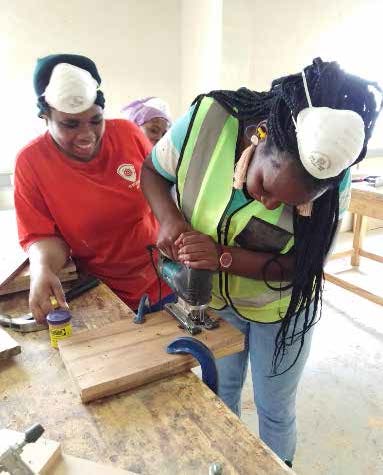
“I realised that there are not a lot of female carpenters in South Africa. This motivated me even more to attain the skills and to become who I am today,” she said.
Sambo said many people advised her to hire men to do the physical work while she managed the business end of things but she remained undeterred.
“I wanted to know how to do the job because I am really passionate about making wooden products.”
And so began a new chapter, which started with Sambo learning everything she could about the furniture manufacturing industry and ended with her owning her own business.
As the business grew, she had to hire additional carpenters but she remains hands-on. While she initially sold her products on a casual basis, early last year Sambo formalised her dream by registering her own company – Imvelo Interiors. She was also offered a learnership and workshop space by Furntech. Furntech has a bilateral agreement with the Small Enterprise Development Agency to build skills development in furniture manufacturing.
Today, Imvelo Interiors employs three people on a permanent basis and offers part-time work when there are a high number of orders to meet.
“Most of my clients are local homeowners and business people in the tourism and hospitality industry,” she said.
Imvelo Interiors manufactures wooden furniture such as television stands, headboards, tables, chairs, wooden doors and window frames.
“I would love to create more jobs, especially for women, because I believe it is time that women realise they can do any kind of job. My focus for now is to get the business off the ground and have my own workshop,” she said.
Sambo advises young people, especially women, to consider a career as an artisan because there are a lot of opportunities available.
Celebrate Africa Day: 25 May
Celebrate Africa Day: 25 May LondekileAll African states celebrate Africa Day annually on 25 May, to commemorate the establishment of the Organisation of African Unity (OAU) in 1963.
On 25 May 1963 leaders from 32 African nations converged in Ethiopia‘s capital, Addis Ababa, to form the OAU. It became known as the African Union (AU) in 2001 and South Africa became a member of the AU following its first democratic elections in 1994.
Africa Day celebrates and acknowledges the AU’s successes in the fight against colonialism and apartheid and the progress Africa has made with the common challenges that the continent faces in a global environment.
South Africa also celebrates Africa Month, in May, to increase the appreciation and demand for arts and culture goods and services and to stimulate competitive markets for trade among African countries.
Arts and Culture Minister Nathi Mthethwa recently launched the Celebrate Africa Carnival and Festival, in Durban, as part of 2019’s Africa Month celebrations.
He confirmed that this year’s theme for Africa Month is Celebrating 25 years of Democracy: Building a Better Africa and a Better World.
“Africa Month is a moment for the continent to pause, reflect, commemorate and celebrate our Africanness and to promote the African agenda that embraces peace and stability; democracy; being non-racial and non-sexist; and unity and prosperity,” he said.
May is dedicated to building a caring nation, in pursuit of promoting lasting peace and prosperity in the country and the rest of the continent.
“Africa Month recognises aspects of African culture, which are both tangible and intangible: creative expression such as music and performances, our historical inheritance, architecture, language, food, practices and culture,” said Minister Mthethwa.
“Various events will be staged throughout the country to commemorate Africa Month and the Department of Arts and Culture will contribute to Africa Month celebrations through a variety of cultural activities,” he added.
Inauguration to take place on Africa Day
The Presidency has announceed that the inauguration of the President-elect, following the elections on 8 May, will take place on Africa Day, at Loftus Versfeld Stadium in Tshwane.
“The announcement affirms government’s commitment to advancing the African agenda and strengthening ties between South Africa and its neighbours,” said The Presidency in a media statement.
Cheers to a trend-setting young winemaker!
Cheers to a trend-setting young winemaker! LondekileBlack female-owned Siwela Wines is helping to transform the South African wine industry by challenging traditional conventions.
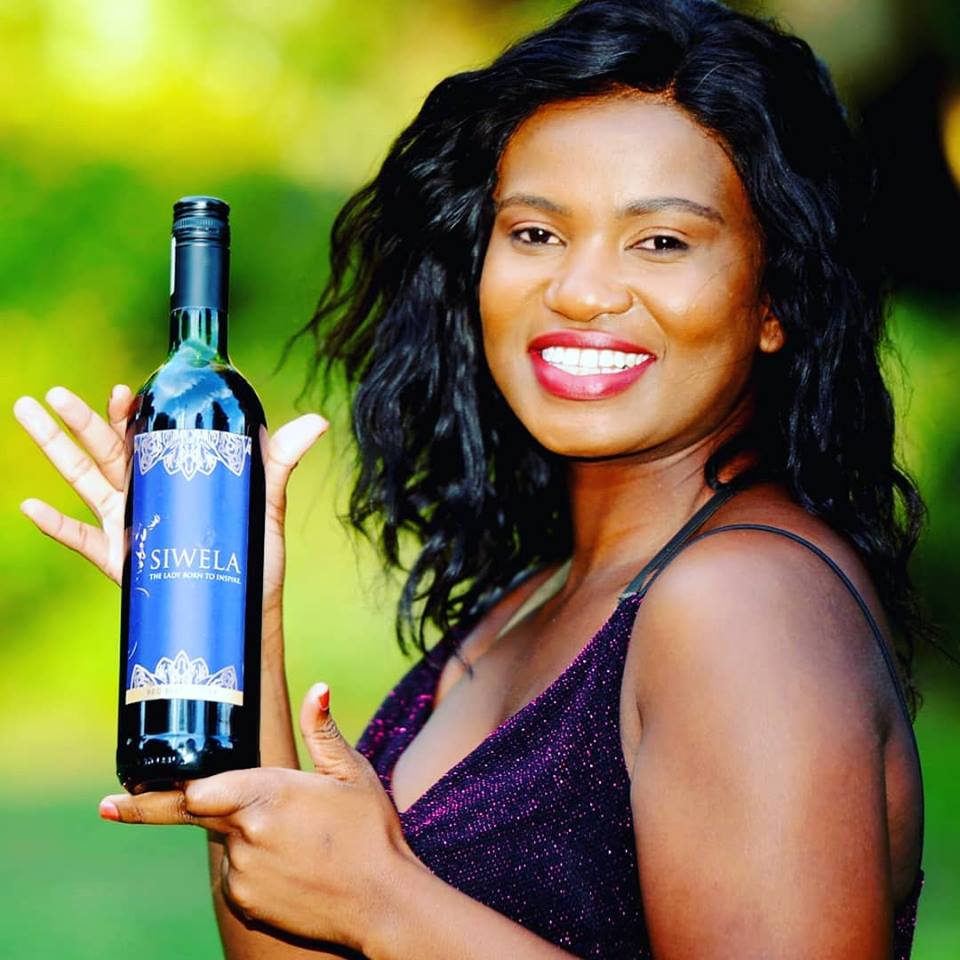 Siwela Masoga is shaking up the wine industry. She is a 28-year-old black female winemaker in a white male-dominated sector and is determined that fellow South Africans join her on a wine revolution.
Siwela Masoga is shaking up the wine industry. She is a 28-year-old black female winemaker in a white male-dominated sector and is determined that fellow South Africans join her on a wine revolution.
Masoga is determined to craft local wines, with locally inspired names and labels, to be paired with South African food, rather than Western cuisine.
It is Masoga’s aim to get more young, black people playing active roles in the domestic wine industry.
Masoga, who was raised in a small Limpopo village, has put down roots in the Western Cape and is the proud owner of Siwela Wines, which are produced in the famous winelands of Stellenbosch and sold by order across the country.
After doing a National Diploma in Biotechnology, majoring in fermentation and microbiology, Masoga accepted a position as an intern at Waterstone Wines in Stellenbosch and so began her journey into the wine industry.
She is currently doing her Masters in Wine Making at the Cape Wine Academy while living her dream as a winemaker.
Siwela Wines currently produces a dry red and a semi-sweet red, and plans to add a sparkling wine and a white wine to its range, which hit the market in August.
The wines have been marketed through social media and word of mouth. Masoga told Vuk’uzenzele that the wine is couriered to customers, many of whom order online on Siwela Wines website: www.siwelawines.co.za. The enterprising businesswoman keeps in touch with her clients after they have received their order.
She explained that winemaking is a natural process which can take up to a year.
Masoga said those who want to study winemaking must focus on mathematics and science subjects at high school level. “If you want to study wine, it has to be something that you are passionate about,” she said.
The South African wine industry employs around 300 000 people, both directly and indirectly.
Freedom returns to State Theatre
Freedom returns to State Theatre Ursula A musical production, Freedom, is returning to stage at the South African State Theatre to tell the story of what occurred during the #FeesMustFall campaigns in 2015 and 2016.
A musical production, Freedom, is returning to stage at the South African State Theatre to tell the story of what occurred during the #FeesMustFall campaigns in 2015 and 2016.
The State Theatre said the musical is this year scheduled to hit the stage from 30 April to 2 June.
The musical was written and directed by multi-award-winning playwright and State Theatre’s artistic director, Aubrey Sekhabi.
“The world premiere of Freedom, which took place in 2018, was hailed by audiences as a true dramatisation of what exactly occurred during the #FeesMustFall campaign. Many students retold their emotional account every time they attended the show,” said Sekhabi.
The musical is made up of a cast of 47 members and a 13-piece band which tells the story of Phindile, who is played by Simphiwe Ndlovu.
In the play, Phindile is a Tshwane University of Technology student and leader of the #FeesMustFall movement. Her life takes a sharp turn after student protests at the Union Buildings in Pretoria.
The play shows how what started as students’ pleas for free education gets distorted by xenophobic attacks and various crimes committed by elements claiming to be part of the movement, but Phindile stops at nothing to fight for the freedom of students and her own.
The story also examines the violent crime that is rife in modern-day society, such as rape, women abuse, racism, xenophobia, corruption and police brutality, which are testimonies of the cost of freedom of the people.
It retells stories of young women like Frances Rasuge, Reeva Steenkamp and Karabo Mokoena, who suffered abuse and perished in the hands of their boyfriends and men in society.
Tickets for Freedom are priced from R100-R300 and are available at Webtickets. The show has a 13 - age restriction. For schools and group bookings, patrons can contact the theatre’s sales office on 012 392 4000 or visit: www.statetheatre.co.za
Giving entrepreneurs wings to fly
Giving entrepreneurs wings to fly angenithaProper research and planning are essential when starting a business.
This is the advice of Marcia Ramatswana of the Small Enterprise Development Agency (Seda).
“Before starting a business, you must have an idea and test the viability of that idea,” said Ramatswana. The Seda business advisor also emphasised the need to check if there is a market for the product or service that you will be offering. If many other businesses offer the same thing as you, your business might not survive.
“You need to have good knowledge of the sector that you are getting into. It’s also very important to have technical information so that when you face challenges or are dealing with suppliers, you have the right information,” said Ramatswana.
Speaking from her Ehlanzeni office in Mpumalanga, the Seda official said aspiring entrepreneurs must do research on what they will need in order to achieve their goal. “An understanding of the product or service is very important, as well as the type of space and equipment you will need. In order to know this, you need to do a formal feasibility study,” she said.
Proper registration with the relevant bodies is also crucial, she added, saying that to comply with the law, business owners must register with the Companies and Intellectual Property Commission and the South African Revenue Service (Sars).
“People are often nervous when you tell them that they have to register with Sars. They think you want them to pay tax but it is so that they can be compliant and not end up being punished.”
Ramatswana cautioned that most businesses fail because of weak management, poor planning and a lack of access to resources. She said: “Have controls in place to guard assets, finances and even the stock or service that you are selling.”
“Some entrepreneurs have good ideas and sound management but still end up failing because of a lack of resources. There are also times when things don’t work because of the dynamics of the industry,” Ramatswana warned.
She said that good marketing is needed to ensure a business succeeds and advised entrepreneurs to take advantage of the opportunities offered by social media.
Contact Seda on 0860 103 703 or via email at: info@seda.org.za.
High-tech schools change education in rural KZN
High-tech schools change education in rural KZN JoyGovernment is stepping up the gear in the provision of technologically advanced schools to ensure the cultivation of much-needed skills.
This was evident in one of three schools officially opened by President Cyril Ramaphosa in Dannhauser, KwaZulu-Natal recently.
Enhlanhleni Primary School was officially opened with two others, Lembe Primary and Ingweni Phaphama, in the Amajuba and Zululand District municipalities.
 At the Enhlanhleni Primary School, President Ramaphosa was introduced to the school’s technologically equipped classrooms that include smart boards and learning tablets for learners across all grades.
At the Enhlanhleni Primary School, President Ramaphosa was introduced to the school’s technologically equipped classrooms that include smart boards and learning tablets for learners across all grades.
President Ramaphosa said the schools looked better than most he had seen in recent times.
“We are not just focusing on the brick and mortar of putting up a school. We are talking about a school that is holistic and well equipped to develop education for our children. It is [not just] about building an infrastructure building like this; it’s about building it in such a way that it is fit for purpose.”
The schools are beneficiaries of the Department of Basic Education’s Accelerated School Infrastructure Delivery Initiative (ASIDI), whose objective is the eradication of schools without water, sanitation and electricity.
ASIDI replaces schools constructed from inappropriate material. Adopt-A-School Foundation is the implementing agent of ASIDI.
The schools were previously mud structures built by communities. They have been replaced with modern brick and mortar structures, with additional design elements that allow for a positive learning environment. The designs comply with current and future school requirements and complement the rural environment in which they are situated.
President Ramaphosa said the three schools epitomised government’s approach to building schools of the future.
“These are the type of schools that we want to see in South Africa. I am proud that we have built this school in the deep rural areas of our country. Today I’ve seen how IT can be one of the best things you can have in a school," the President said.
SAnews.gov.za
How to draft a winning CV
How to draft a winning CV angenithaYour CV is your ticket to employment and its importance should not be underestimated.
Most job-seekers struggle to put a good curriculum vitae (CV) or resume together, and this sometimes lessens their chances of getting shortlisted and being invited for job interviews.
Vuk’uzenzele contacted the Youth Employment Service (YES) for tips on how to write a good CV.
YES is a joint initiative established by government, labour and business to prepare young people for employment and provide them with the technical skills needed to underpin the industrialisation of the economy.
It seeks to offer paid work experiences for at least one year to one million South African youth.
Research undertaken by stakeholders indicates that one year of work experience on a CV, with a reference letter, increases a young person’s chance of finding employment threefold.
YES explained that ‘CV’ is a Latin expression that means ‘The course of life’.
“In your CV, you are trying to capture what course or journey your life has been on so far… within six seconds of reading your CV, a recruiter knows whether or not you are right for the job,” the organisation said.
Top tips
- Use good English to write your CV. Have it proofread by someone. Spelling mistakes will be picked up.
- Make it short and sweet – minimum of two and maximum of three pages.
- Type it up professionally.
- Have a printed version of it and a computerised version as well because many companies only accept computerised CVs.
In summary, YES said your CV should say who you are, what you currently do, what you want to do or the job you are looking for. It should also include your contact details, educational qualifications, work experience and interests or hobbies.
It is also important to highlight why the employer should be interested in you.
According to job portal www.pnet.co.za, you must ensure you have the right qualifications and skills for the job you are applying for.
Also, do not submit exactly the same CV for different positions. Instead, tailor your CV for every position that you apply for by editing your personal statement and leaving out or adding in certain information.
IEC preparing to announce election results within seven days
IEC preparing to announce election results within seven days JoyThe Electoral Commission of South Africa (IEC) has assured South Africans that it will only announce the results for elections when it is 100 percent confident in the integrity and legitimacy of the results.
The Commission’s Chief Electoral Officer Sy Mamabolo held a briefing on Thursday at the National Results Operations Centre in Pretoria.
“By law the Electoral Commission has seven days in which to announce the results of the elections and is confident this exercise will be completed in time to provide assurance of the integrity of the results within this period,” Mamabolo said.
He added the results capture and verification process would continue and called on political parties, the media and all South Africa to show patience, calm and restraint as the process to ensure confidence is undertaken.
Auditing election results
Mamabolo said the IEC will urgently conduct an audit of results and votes cast in a sample of voting stations to ascertain if double voting occurred.
He said the audit will cover a statistically representative sample of voting stations as well as all voting stations where complaints or allegations of double voting had been received.
The final number and selection of the sample will be determined in conjunction with expert statisticians.
“The process was endorsed by political parties in the party liaison committee today,” he explained.
Mamabolo said the audit will involve the capture of information showing ID numbers of voters who cast votes at each voting station from the “zip-zip” scanners and completed VEC 4 forms.
Data will then be cross-referred and compared to identify any instances of multiple voting to help establish scientifically whether such instances were isolated or systematic and what the material impact is, if any, on the results.
“In most voting districts the VEC 4 forms and the zip-zips have already been returned to local offices as part of the roll-back of materials following the conclusion of counting.”
Arrest of voters for double voting
“The Electoral Commission is encouraged by the rapid arrest of four voters in KwaZulu-Natal in connection with alleged double voting,” said Mamabolo.
“As noted yesterday, any attempt to vote more than once leaves a clear footprint in the electoral process and the suspects were tracked down using this information,” he added.
He said the commission has also ordered an investigation into the effectiveness of the indelible ink marker pens supplied for the elections.
According to Mamabolo, the investigation will be conducted in conjunction with the CSIR and with the full cooperation and support of the supplier.
Approximately 200 000 pens were procured through the normal open tender process according to specifications set out by the IEC.
“In an attempt to increase the effectiveness of the pens, the Electoral Commission had raised the percentage of silver nitrates from 15 percent used in the previous elections to 20 percent,” Mamabolo explained.
For updates relating to elections results logon to @VukuzenzeleNews and @PublicSectorMan on Facebook and Twitter.
Jobs: Department of Labour - May 2019
Jobs: Department of Labour - May 2019 UrsulaDirector: Labour Centre Operations
Provincial Office: Gauteng
Reference No: HR 4/19/5/1HO
All inclusive: R1 005 063 per annum
Enquiries: Mr. T J Mokomatsidi, Tel: (011) 853 0300
Head Office: Chief Director: Human Resources Management: Private Bag X 117, Pretoria, 0001
Deputy Director: Human Resource Management
Centre: Provincial Office: Limpopo-
Reference No: HR 4/4/6/77
Salary: All Inclusive: R 733 257 per annum
Enquiries: Ms. T Maluleke, Tel: (015) 290 1662
Provincial Office: Chief Director: Provincial Operations: Private Bag X 9368 Polokwane, 0700
Disability Manager (Assistant Director: Occupational Therapy)
Centre: Provincial Office: Kimberley
Reference No:
Salary: R 517 326.00 per annum (OSD)
Enquiries: Dr. Jood-Molaolwe, Tel: (053) 838 1588/1589
Provincial Office: Chief Director: Provincial Operations: Private Bag X 5012, Kimberley, 8301
Assistant Director: Collective Bargaining (2 posts) (RE-advert applicants who applied before must re-apply)
Centre: CD: Labour Relations, Head Office- Reference No: HR4/19/05/03HO
Salary: R 470 040 per annum
Enquiries: Ms. MM Ngwetjana, Tel: (012) 309 4112/Ms. SK Mahlangu, Tel: (012) 309 4588
Head Office: Chief Director: Human Resources Management: Private Bag X 117, Pretoria, 0001
Deputy Director: Labour Centre Operations (3 posts)
Labour Centre: Bethlehem
Reference No: HR 4/4/8/234(1 post)
Labour Centre: Kuruman
Reference No: HR4/4/8/12(1 post)
Labour Centre: Springbok
Reference No: HR4/4/8/13(1 post)
Salary: All inclusive: R 869 007 per annum
Enquiries: Mr. S Segalo, Tel: (051) 505 6206 Mr. ZL Albanie, Tel: (053) 838 1500
Provincial Office: Chief Director: Provincial Operations: P O Box 522, Bloemfontein, 9300 Chief Director: Provincial Operations: Private Bag X 5012, Kimberley, 8301
Deputy Director: PERSAL
Centre: Directorate: Financial Management,
Head Office -Reference No: HR 4/19/05/04 HO
Salary: All Inclusive: R 733 257 per annum
Enquiries: Mr. DE Kyle, Tel: (012) 309 4298
Head Office: Chief Director: Human Resources Management: Private Bag X 117, Pretoria, 0001
Assistant Director: Public Employment Services
Centre: Provincial Office: Western Cape
Reference No: HR4/4/1/170
Salary: R 470 040 per annum
Enquiries: Ms. Z Maimane. Tel: (021) 441 8125
Provincial Office: Chief Director: Provincial Operations: P O Box 872, Cape Town, 8000
Assistant Director: Statutory Services
Centre: Provincial Office: Mpumalanga
Reference No: HR4/4/9/28
Salary: R 376 596 per annum
Enquiries: Ms. NL Njwambe, Tel: (013) 655 8775
Provincial Office: Chief Director Provincial Operations: Private Bag X 7263, Emalahleni, 1035
Deputy Director: Supply Chain Management
Centre: Sheltered Employment Enterprise- Reference No: HR 4/19/05/2SEE
Salary: All Inclusive: R 733 257 per annum
Enquiries: Mr. S Ngcongo, Tel: (021) 843 7300
Head Office: Chief Director: Human Resources Management: Private Bag X 117, Pretoria, 0001
Counsellor
Centre: Labour Centre: Vanderbijlpark
Reference No: HR 4/4/4/03/09
Grade 1: R579 147 - R642 765 (OSD),
Grade 2: R662 190 – R734 928 (OSD)
Grade 3: R750 024 – R832 398 (OSD)
Enquiries: Mr. MH Tabane, Tel: (016) 981 0208
Provincial Office: Chief Director: Provincial Operations: PO Box 4560, Johannesburg, 2001
Assistant Director: Labour Relations (Research Monitoring and Evaluation)
Centre: Provincial Office: Kwazulu- Natal
Reference No: HR4/4/5/39
Salary: R 470 040 per annum
Enquiries: Mr. SJ Maseko. Tel: (031) 366 2078
Provincial Office: Chief Director: Provincial Operations: P O Box 940, Durban, 4000
Assistant Director: Factory Production Operations
Centre: Sheltered Employment Enterprise, Bloemfontein-Reference No: HR4/19/05/02
Salary: R 470 040 per annum
Enquiries: Ms. G Manamela, Tel: (012) 843 7300
Head Office: Chief Director: Human Resources Management: Private Bag X 117, Pretoria, 0001
Assistant Director: Human Resource Management and Employment Relations (2 posts)
Centre: Provincial Office: Mpumalanga
Reference No: HR4/4/7/16 (1 post)
Provincial Office: East London
Reference No: HR4/4/1/201(1 post)
Salary: R 376 596 per annum
Enquiries: Mr. LM Nkotsoe, Tel: (013) 655 8762 Mr. WG Dumalisile, Tel: (043) 701 3032
Provincial Office: Chief Director Provincial Operations: Private Bag X 7263, Emalahleni, 1035
Chief Director: Human Resources Operations: Private Bag X 9005, East London, 5201
Deputy Director: Finance and Office Administration (X 3 posts)
Provincial Office: East London
Reference No: HR 4/4/1/149 (1 post)
Provincial Office: Mpumalanga
Reference No: HR4/4/7/29(1 post)
Provincial Office: Limpopo- Reference No: HR4/4/6/78(1 post)
Salary: All Inclusive: R 733 257 per annum
Enquiries: Ms N Douw-Jack, Tel: (043) 701 3128, Ms. T Maluleke, Tel: (015) 290 1662, Ms. M Mazibuko, Tel: (013) 655 8701
Provincial Office: Chief Director: Human Resources Operations: Private Bag X 9005, East London 5201
Chief Director: Provincial Operations: Private Bag X 9368 Polokwane, 0700
Chief Director: Provincial Operations: Private Bag X 7263, Emalahleni, 1035
Assistant Director: Risk Management
Centre: Provincial Office: Mmabatho
Reference No: HR4/4/9/70
Salary: R 376 596 per annum
Enquiries: Ms. BK Matlhako, Tel: (018) 3878 100
Provincial Office: Chief Director Provincial Operations: Private Bag X 2040, Mmabatho, 2735
Assistant Director: Fleet Management Services (2 posts)
Centre: Provincial Office: Limpopo
Reference No: HR4/4/6/85 (1 post)
Provincial Office: Western Cape
Reference No: HR4/4/10/19(1 post)
Salary: R 376 596 per annum
Enquiries: Ms. T Maluleke, Tel: (015) 290 1662, Ms. Z Maimane. Tel: (021) 441 8125
Provincial Office Chief Director: Provincial Operations: Private Bag X 9368 Polokwane, 0700
Chief Director: Provincial Operations: P O Box 872, Cape Town, 8000
Closing date for applications: 3 June 2019 at 16:00. For full details of the advertised posts visit our website: www.labour.gov.za
Applications must be submitted on a Z83 form, obtainable from any Public Service Department or on the internet at www.gov.za/documents. The fully completed and signed form Z83 should be accompanied by a recently updated, comprehensive CV as well as recently certified copies of all qualification(s), academic records including a Senior Certificate and ID-document [Driver’s license where applicable](Certified copy of a copy will not be accepted). The certification must be within three (3) months as at the advert closing date. Non-RSA Citizens/Permanent Resident Permit Holders must attach a copy of their Permanent Residence Permits to their applications. Should you be in possession of a foreign qualification, it must be accompanied by an evaluation certificate from the South African Qualification Authority (SAQA) including Matric. Applicants who do not comply with the above-mentioned requirements, as well as applications received late, will not be considered. The Department does not accept applications via fax or email. Failure to submit all the requested documents will result in the application not being considered. Correspondence will be limited to short-listed candidates only. If you have not been contacted within eight (8) weeks after the closing date of this advertisement, please accept that your application was unsuccessful. Suitable candidates will be subjected to a personnel suitability check (criminal record, citizenship, credit record checks, qualification verification and employment verification). Where applicable, candidates will be subjected to a skills/knowledge test. All shortlisted candidates for SMS posts will be subjected to a technical competency exercise that intends to test relevant technical elements of the job, the logistics of which be communicated by the Department. Following the interview and technical exercise, the selection panel will recommend candidates to attend generic managerial competencies using the mandated DPSA SMS competency assessment tools. Successful candidates will be appointed on a probation period of 12 months. The Department reserves the right not to make any appointment(s) to the above post. The successful candidate will be expected to sign a performance agreement. The Department of Labour is an equal opportunity affirmative action employer. The employment decision shall be informed by the Employment Equity Plan of the Department. It is the Department’s intention to promote equity (race, gender and disability) through the filling of this post(s) with a candidate whose transfer / promotion / appointment will promote representativity in line with the numerical targets as contained in our Employment Equity Plan.

Jobs: The Department of Justice and Constitutional Development - May 2019
Jobs: The Department of Justice and Constitutional Development - May 2019 UrsulaDeputy Director: Third Party Funds
Reference:19/Va25 /NW
Centre: Regional Office: NW
Salary: R733 257 – R863 748 per annum (All inclusive remuneration package). The successful candidate will be required to sign a performance agreement.
Requirements: A Degree/National Diploma in Financial Management or equivalent qualification; A minimum of five (5) years relevant experience in a financial accounting/management environment, of which a minimum of three (3) years should be at supervisory/management level; A sound knowledge of the Public Finance Management Act and National Treasury Regulations; Extensive knowledge of the Department of Justice and Constitutional Development and its Third Party Functions and services; Knowledge of Third Party Functions (TPF) system and a recognized accounting software package will be an added advantage; Knowledge of GRAP/GAAP, trust Account; A valid driver’s licence.
Enquiries: Ms. L Shoai : (018) 397 7088.
Senior Assistant State Attorney, (Lp5-Lp6) (4 Posts) Reference: 19/51/Sa
Centre: State Attorney: Johannesburg
Reference: 19/52/Sa
Centre: State Attorney: Mmabatho
Reference: 19/61/Sa
Centre: State Attorney: Cape Town
Salary: R510 432 – R1 192 947 per annum (Salary will be in accordance with OSD determination). The successful candidate will be required to sign a performance agreement
Requirements: An LLB or 4 year recognized legal qualification; Admission as an Attorney; At least 4 years appropriate post qualification legal/ litigation experience; A thorough knowledge of legal practice, office management, legal costs and trust accounts; The right of appearance in the High Court of South Africa; Knowledge of the government prescripts and transformation objective as well as the Constitution of South Africa; Experience in conveyancing will be an added advantage; A valid driver’s licence.
Enquiries: Mr. E. Seerane: (012) 315 1164
Court Manager
Reference: 27/19/Lmp
Centre: Magistrate Mankweng
Salary: R470 040 – R553 677 per annum. The successful candidate will be required to sign a performance agreement.
Requirements: Three (3) year qualification in Administration (NQF level 6) and / or National Diploma in Services Management (NQF level 5) plus the module on Case Flow Management or equivalent qualification; At least 3 year’s managerial or supervisory experience; Knowledge of an experience in office and district administration; Knowledge of Public Financial Management Act (PFMA); Experience in managing Trust (Third Party Funds) and Vote Account; A valid driver’s licence; Experience in the Court environment will be an added advantage;
Enquiries: Mr Maakamedi TP: (015) 287 2026 or Ms Mongalo MP: (015) 287 2037
Assistant Director: Facilities Management (Re-Advert) Reference: 26/19/Lmp
Centre: Regional Office, Limpopo
Salary: R 376 596 – R 443 601 per annum. The successful candidate will be required to sign a performance agreement
Requirements: An appropriate three year National Diploma/degree or equivalent qualification; (Building, Electrical and Civil Engineering or related); Three years supervisory/management experience; Three years facilities and Auxiliary services experience; A valid driver’s licence.
Enquiries: Mr. Maakamedi TP: (015) 287 2026 or Ms. Mongalo MP: (015) 287 2082
Assistant Director: Third Party Funds
Reference: 19/Va26/NW
Centre: Regional Office: North West
Salary: R376 596 – R443 601 per annum. The successful candidate will be required to sign a performance agreement.
Requirements: Relevant three year tertiary qualification in in Commerce, Accounting or relevant equivalent qualification: A minimum of three (3) years working experience in a financial accounting/management environment, of which a minimum of 1 year should be at supervisory/junior management level: A valid driver’s licence; Knowledge of GRAP/GAAP, accrual accounting as well as modified cash Knowledge and experience of Third Party Funds functions and services will be an added advantage.
Enquiries: Ms L. Shoai (018) 397 7054
Assistant Director: Human Resources
Reference: 19/56/HR
Centre: National Office, Pretoria
Salary: R376 596 – R443 601 per annum. The successful candidate will be required to sign a performance agreement.
Requirements: 3 year Bachelor’s Degree/ National Diploma in Human Resource Management or equivalent qualification at NQF6; A minimum of 5 years relevant experience in the field of Human Resource Administration within the Public Service; Knowledge and application of the PERSAL System; Knowledge of relevant HR Good interpersonal relations and communication skills; Ability to work independently in a highly management legislation and directives.
Enquiries: Ms M Qhamakoane: (012) 357 8591
Assistant State Attorney, (Lp3-Lp4) (2 Posts)
Reference: 19/58/Sa
Centre: State Attorney: East London
Reference: 19/48/Clo
Centre: State Attorney: Pretoria
Salary: R301 452 – R847 047 per annum. (Salary will be in accordance with OSD determination). The successful candidate will be required to sign a performance agreement.
Requirements: An LLB or 4 year recognized legal qualification; Admission as an Attorney; At least 2 years appropriate post qualification legal/litigation experience; Right of appearance in the High Court of South Africa; A valid driver’s licence.
Enquiries: Ms. K. Ngomani: (012) 357 8661
Assistant State Attorney, (Lp3-Lp4)
Reference: 19/59/Clo
Centre: State Attorney: Pretoria
Salary: R301 452 – R847 047 per annum. (Salary will be in accordance with OSD determination). The successful candidate will be required to sign a performance agreement.
Requirements: An LLB or 4 year recognized legal qualification; Admission as an Attorney; At least 2 years appropriate post qualification legal/litigation experience; Admission as a Conveyancer will be an added advantage; A valid driver’s licence.
Enquiries: Ms. K. Ngomani: (012) 357 8661
Social Worker/ Family Counsellor (Grade 1)
Reference: 31/19/Fa/Wc
Centre: Office Of The Family Advocate, Cape Town
Salary: R257 592 – R298 614 per annum. (Salary will be in accordance with OSD determination). The successful candidate will be required to sign a performance agreement.
Requirements: Bachelor Degree in Social Work or equivalent qualification which allows for professional registration with the SACSSP (SA Council for Social Service Profession); Appropriate experienvce in social work after registration as Social Worker with the SACSSP; Knowledge and experience in Mediation. Court Experience in rendering expect Evidence; Knowledge and application of Family Law, including Mediation in certain Divorce Matters Act , Children’s Act, Maintenance Act and Domestic Violence Act (inclusive of Hague Convention on International Child Abduction); A valid drivers’ licence.
Enquiries: Adv. N Britz: (012) 462 1216
Closing Date: 03 June 2019
Note: Interested applicants may visit the following website: www.justice.gov.za or www.dpsa.gov.za to view the full job specification of the above positions. Applications must be submitted on Form Z83, obtainable from any Public Service Department or on the internet at www.gov.za. A Z83 form & CV must be accompanied by original certified copies of qualifications, identity document and a driver’s license where necessary. A SAQA evaluation report must accompany foreign qualifications. Applications that do not comply with the above mentioned requirements will not be considered. All shortlisted candidates for SMS posts will be subjected to a technical and competency assessment. Candidate will complete a financial disclosure form and also be required to undergo a security clearance. The foreigners or dual citizenship holder must provide the Police Clearance certificate from country of origin. The DOJ&CD is an equal opportunity employer. In the filling of vacant posts the objectives of section 195 (1) (i) of the Constitution of South Africa, 1996 (Act No: 108 of 1996), the Employment Equity imperatives as defined by the Employment Equity Act, 1998 (Act No: 55 of 1998) and relevant Human Resources policies of the Department will be taken into consideration. Reasonable accommodation shall be applied for People with Disabilities including where driver’s license is a requirement. Correspondence will be limited to short-listed candidates only. If you do not hear from us within 3 months of this advertisement, please accept that your application has been unsuccessful. The department reserves the right not to fill these positions. Women and people with disabilities are encouraged to apply and preference will be given to the EE Target.
Tel: 012 315 1111 Private Bag X81, Pretoria, 0001 Momentum Centre, 329 Pretorius Street, Pretoria www.justice.gov.za @DOJCD_ZA at DOJCD

KZN sanitary dignity programme brings smiles
KZN sanitary dignity programme brings smiles UrsulaThe Sanitary Dignity Framework Programme will have a lasting impact on schools and local communities.
At the launch of the KwaZulu-Natal leg of the pilot programme, additional learners in need of support were added to the beneficiaries' list.
A teacher at Nkonkoni Primary School in Umlazi, Sibongile Nxumalo, said the inclusion of her school in the programme is good news.
“Most of our learners come from underprivileged homes and are in desperate need of sanitary pads,” said Nxumalo.
Government is committed to ensuring young girls remain in school and that the access to sanitary dignity products is universal. As such, it announced a zero-tax rating on sanitary products, which took effect from 1 April 2019.
Since 2016, the Department of Women has coordinated the development of the Sanitary Dignity Policy Framework which seeks to provide minimum norms and standards for the provision of sanitary towels to indigent girls and women.
Too often, girls miss school when they are menstruating because they cannot afford to purchase sanitary products.
In addressing the plight of girl children, a multi-pronged approach has been followed. According to the Department of Women, the framework is aimed at increasing the participation of women in the entire sanitary product value chain, from sanitary pads production, to transportation, storage and disposal.
Spokesperson for the Department of Women, Shalen Gajadhar, said the project will empower women entrepreneurs and be women-driven.
The department will also work with the Department of Social Development to teach pupils about the changes, both physical and emotional, that come with going through puberty.
Gajadhar said the programme will look at the proper disposal of sanitary towels. He said: “When you look at schools, the female bathrooms are more often clogged than the male ones because schoolgirls going through their cycle tend to flush toilet paper and old rags down the toilet. In a school with 10 toilets, you find that only one or two are working.”
KwaZulu-Natal has been allocated R27 million to roll-out sanitary towels in the 2019/20 financial year. Earlier launches of the programme took place in Piet Retief in Mpumalanga and in Makana in the Eastern Cape.
Male midwife shatters female-only stereotype
Male midwife shatters female-only stereotype angenithaThe occupation of midwifery has traditionally been for women but there are a few wonderful male midwives, including a veteran of nearly 30 years.
Over the past 27 years, Joshua Mashiloane (57) has brought countless babies into the world.
He is one of few men who have entered the women-dominated field of midwifery and his love of babies and respect of women and the miracle of birth have ensured that his job is a constant joy to him.
“Women must be respected. They must be taken care of like you take care of your kids and your wife,” said Mashiloane, who works at the Rethabile Healthcare Centre in Polokwane, Limpopo.
He said his job has taught him a lot about different cultures and how women from some cultures do not want a male midwife because of their beliefs.
Other patients, however, ask for him when they go for check-ups at the healthcare centre.
“In the beginning, ladies were uncomfortable with being assisted by a male... I showed them that, above all, I am a nurse and they started to trust me,” he said, when sharing memories of his early days in the profession.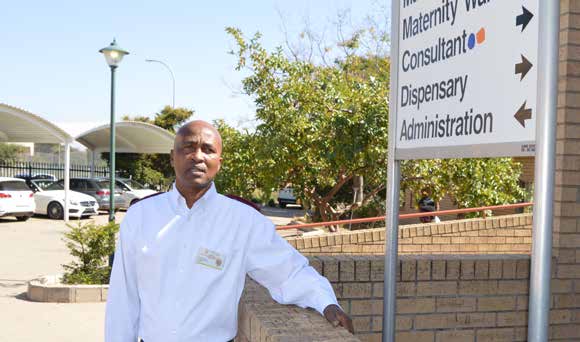
Mashiloane started as a nurse in 1985 before furthering his studies and specialising in midwifery to become an accoucheur, which is the term used to describe male nurses who are midwives.
He said he has helped women give birth to thousands of children since delivering his first baby in 1992, when he stood in awe of the baby in his hands and the tangible bond between the mother and her newborn.
Mashiloane said the job entails more than just helping with the birthing process; he also helps patients during antenatal visits at which check-ups are done.
“This is a women-dominated profession but there is a place for men too. The profession also helps men to respect women. I think it’s a calling. You must have passion and love midwifery,” he said.
South Africa celebrates International Day of the Midwife on 5 May.
Did you know?
International Nurses Day is celebrated around the world every year on 12 May, the anniversary of Florence Nightingale’s birth. Nightingale is considered the founder of modern nursing.
Meeting the psychological needs of learners
Meeting the psychological needs of learners LondekileThe Gauteng Department of Education identifies and helps learners who require additional support to enhance their participation and inclusion in school.

According to Nausheen Ameen of the Gauteng Department of Education (GDE), children are in dire need of support and guidance.
Ameen is an educational psychologist who heads the psychological, therapeutic and medical services unit at the provincial department.
Among other things, her job demands that she coordinates the work done by the 44 other educational psychologists employed by the department and based across all districts.
“The main function of our work is to provide support to psychologists who deal with learners experiencing learning difficulties,” she explained.
“We have to ensure that children are able to function within the education system, which comprises family, community and a school. Our system is a circuit. We cannot say learners are the responsibility of parents alone, or teachers alone… we need every one of them to work together for the benefit of our learners. Our job is to coordinate that,” she added.
The well-being of a child
Ameen said there are many factors that affect children’s well-being, including medical and psychological conditions, trauma, abuse, violence, being bullied and other family-related challenges such as parents going through a divorce or separation or a family member who has just passed on. The list is endless.
She said not all learners are able to cope with these challenges and some end up experiencing difficulty in learning, or even needing to be placed in a special school.
According to Ameen, the department’s Screening, Identification, Assessment and Support Policy is used to identify learners with special education needs.
“According to the policy, teachers who identify a learner who needs a special education offering must escalate the case to a school-based support team which will further escalate it to the relevant district-based support team, which will then determine the learner’s needs,” she explained.
Diagnosing children
Ameen said the number of children who need psychological, therapeutic and medical services is on the rise in the country.
She said in her office alone, she receives over 50 cases a month.
“Not every parent can afford to take their children for psychotherapy privately because psychologists are expensive, therefore we have GDE educational psychologists available to asses children’s needs,” she said.
After the learner has been identified, an educational psychologist does an assessment and ensures that therapy and counselling are provided, where necessary.
She then refers the case – with recommendations of what needs to be done – to a district educational psychologist where the learner is based, so that they can contact the parent or guardian to set-up an appointment for further intervention.
Ameen said sometimes parents themselves pick up on challenges facing their child and call the department through the MEC’s office.
“When we get these referrals from parents, we go through the same process of assessing the case before we can decide what is best for the child in terms of being placed in the correct school to meet their needs,” she said.
She added that her unit also works very closely with social workers employed by the department because some cases need more than psychological attention.
If you suspect that your child needs psychological assistance, contact the Department of Basic Education: 0800 202 933 or email: Callcentre@dbe.gov.za
Neighbourhood watches empower citizens to combat crime
Neighbourhood watches empower citizens to combat crime UrsulaWant a safer community? Neighbourhood watches take responsibility for their security by working closely with the police to prevent and combat crime.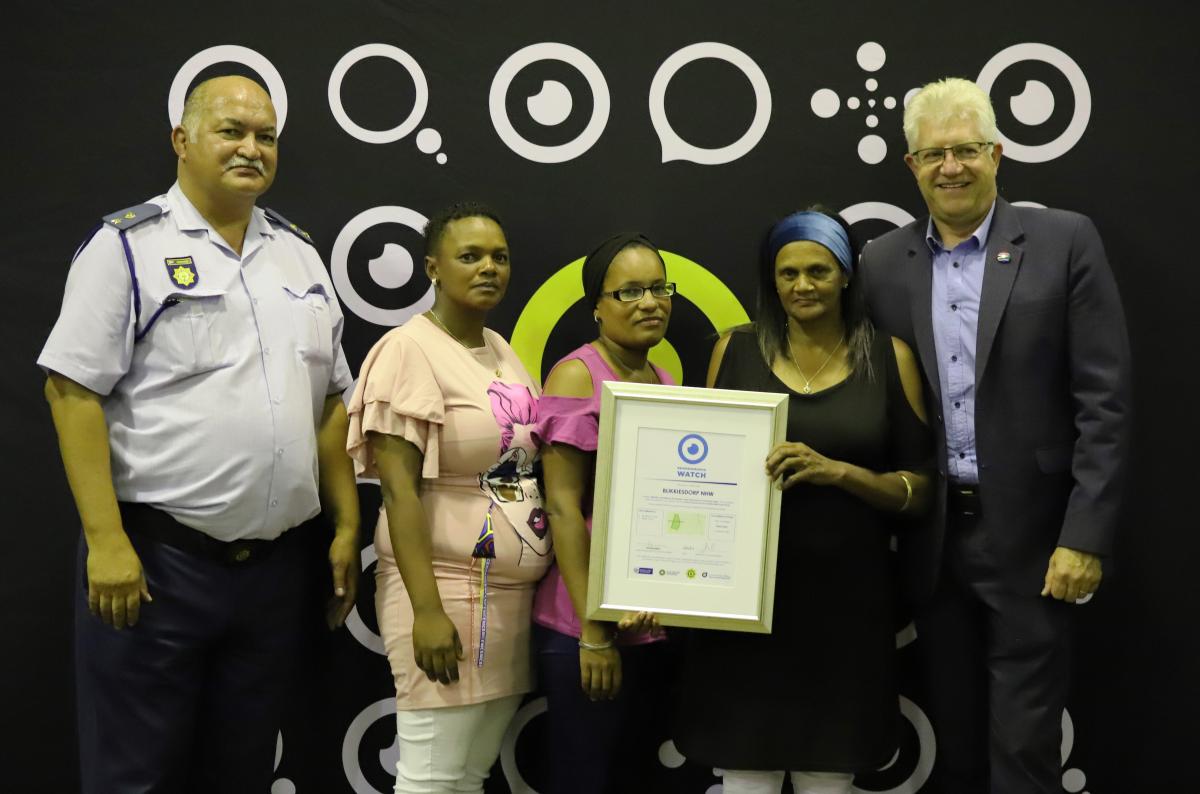
Members of the public do not have to feel powerless in the face of crime. In South Africa, neighbourhood watch groups comprising local residents are playing an important role in preventing crime, working hand-in-hand with the South African Police Service (SAPS) and security companies.
In the Western Cape, more than 300 neighbourhood watch groups have been formally accredited under the Neighbourhood Watch Accreditation and Support Programme, which started in 2016. The programme empowers everyday citizens to prevent and respond to crime and violence in their communities.
“Neighbourhood watches are the eyes and ears of the police; they know what is happening on the ground before the police do,” explained Ishaam Davids, spokesperson for the Western Cape Department of Community Safety.
He said offenders will more than likely be deterred if they are aware that local residents are on the alert and ready to report suspicious behaviour.
Members of a neighbourhood watch that is accredited by the department undergo a two-day training course that includes information about legal rights, patrolling, communication with crime-fighting authorities and how to run the organisation efficiently. They also receive a starter kit with equipment such as reflective vests, torches, first aid kits, fire extinguishers, safety whistles, vehicle decals and strobe lights for cars.
In the northern suburbs of Cape Town, the Amandel and Surrounds Crime Watch (ASCW) has 26 members who patrol areas in Kuils River.
“We encourage all South Africans to join their local neighbourhood watch and start taking responsibility for community safety – the police don’t have the manpower to do everything,” said ASCW chairperson Dr Jürgen Seifert.
The hard work and dedication of the Western Cape’s neighbourhood watches have paid off, with a 6.8 percent reduction in property-related crime last year.
Did you know?
If you want to register a neighbourhood watch, contact your nearest police station or local Community Policing Forum to find out what steps you need to take.
Remember, to become a member of a neighbourhood watch, you will need to have SAPS clearance, which means your fingerprints will be taken to establish that you do not have a criminal record.
New app warns farmers about looming drought
New app warns farmers about looming drought angenithaA Free State scientist has developed a drought early warning system that integrates indigenous and scientific knowledge to help farmers withstand severe weather.
Climate change is rapidly impacting Africa but a dedicated and innovative scientist, Prof Muthoni Masinde (43) is doing her bit to help the continent withstand drought, using her ITIKI Drought Prediction Tool.
ITIKI, which is an acronym for Information Technology and Indigenous Knowledge with Intelligence, is a bridge that integrates indigenous and scientifi drought forecasting.
‘Itiki’ was the name of indigenous bridges built of sticks and used for decades to cross rivers in Eastern Kenya.
She has first-hand experience of how drought can affect communities. 
ITIKI is the result of her mission to fuse the indigenous knowledge systems she learnt while ploughing and herding livestock in her village with her knowledge of technology.
Prof Masinde’s ITIKI app can predict floods and drought but her focus is more on droughts as they last longer and their consequences are more severe.
Being highly competent in mathematics and science in school, she aspired to be a doctor until a high school teacher told her about computer science.
Prof Masinde has achieved numerous awards for her work, including the Distinguished Young Woman in Science Award from the Department of Science and Technology, three awards from the Central University of Technology (CUT) in the Free State and a Securing Water for Food grant worth USD 500 000.
The mother of four has partnered with the South African Weather Services and the universities of KwaZulu-Natal and the Free State, and has teams in Kenya, Mozambique and South Africa to warn farmers of looming drought conditions.
Prof Masinde is the Head of Information Technology at the Faculty of Engineering, Built Environment and Information Technology at CUT. She recently returned from Washington DC where she presented her tool to world leaders and climate change activists at the World Bank Water Week.
Observers give feedback on SA elections
Observers give feedback on SA elections LondekileThe Chief Executive Officer of the Nelson Mandela Foundation, Sello Hatang, says the Electoral Commission of South Africa (IEC) has worked hard to deliver this year’s National and Provincial Elections.
He gave the media a preliminary feedback on the foundation’s role as an observer of the 2019 general elections.
He said the foundation has not yet been able to go through all observer reports, which will be released in the next 30 days.
Hatang said the foundation holds the view that the elections represented the wishes of the late former President Nelson Mandela.
“The staff members at the ground level also did a sterling job during this elections,” he added.
Hatang commended political parties and party agents for observing the rules relating to the elections, although he admitted that there were few exceptions.
He said the foundation identified the following concerns:
- Orientation of the voting booths - “It did not give a sense of secrecy during the ballot marking process. In almost every station we observed people complained about the new ATM style booths,” he explained.
- The issue of voting stations not opening on time - “There were a number of stations that opened late, but all of them opened although some were late,” he added.
- Delays caused at multiple stations - “The scanners were some of the resources that caused delays and people were made to wait. Insufficient ballot papers were also concerning. Some stations ran-out of ballot papers within the first hour of opening, which showed there was no proper planning in that regard,” he said.
Hatang raised concerns about how the needs of the elderly and people living with disabilities were accommodated. He said at some stations these voters were made to follow the queue.
He said while the integrity of the 2019 general elections is secure, the election process has areas of vulnerability and, moving forward, work needs to be done to improve those areas.
“We will be making recommendations to the IEC,” added Hatang.
Reflecting on the low levels of participation in this year’s elections he said:
“This says something about people having lost hope in democracy. There are many reasons why people did not come through but we need to bring back those long queues [witnessed in the 1994 elections] because they tell us that people believe that the democracy of their country is not captured.”
The Nelson Mandela Foundation had 41 observers on the ground, who were based in Gauteng.
Former Nigerian President and Head of the Electoral Institute for Sustainable Democracy in Africa (EISA), Goodluck Jonathan, also weighed in on the elections.
Jonathan said EISA is satisfied that the elections had been free and fair with all parties adhering to the laws set out in the Electoral Act.
Protecting the rights and well-being of South African workers
Protecting the rights and well-being of South African workers JoyMay is Workers’ Month and every day of this month is dedicated to recognising the meaningful contributions and sacrifices made by all workers in growing the South African economy.
Workers are the backbone of the South African economy and an integral part of our society. Their contributions in the different spheres of work help to facilitate the achievement of the cherished objective to build a stable and prosperous country.
Some of the workers worth acknowledging include farm workers who work the land to ensure food security for all of us; bus drivers who leave their homes at the crack of dawn to transport other workers to work, and law-enforcement officers who keep us and our properties safe.
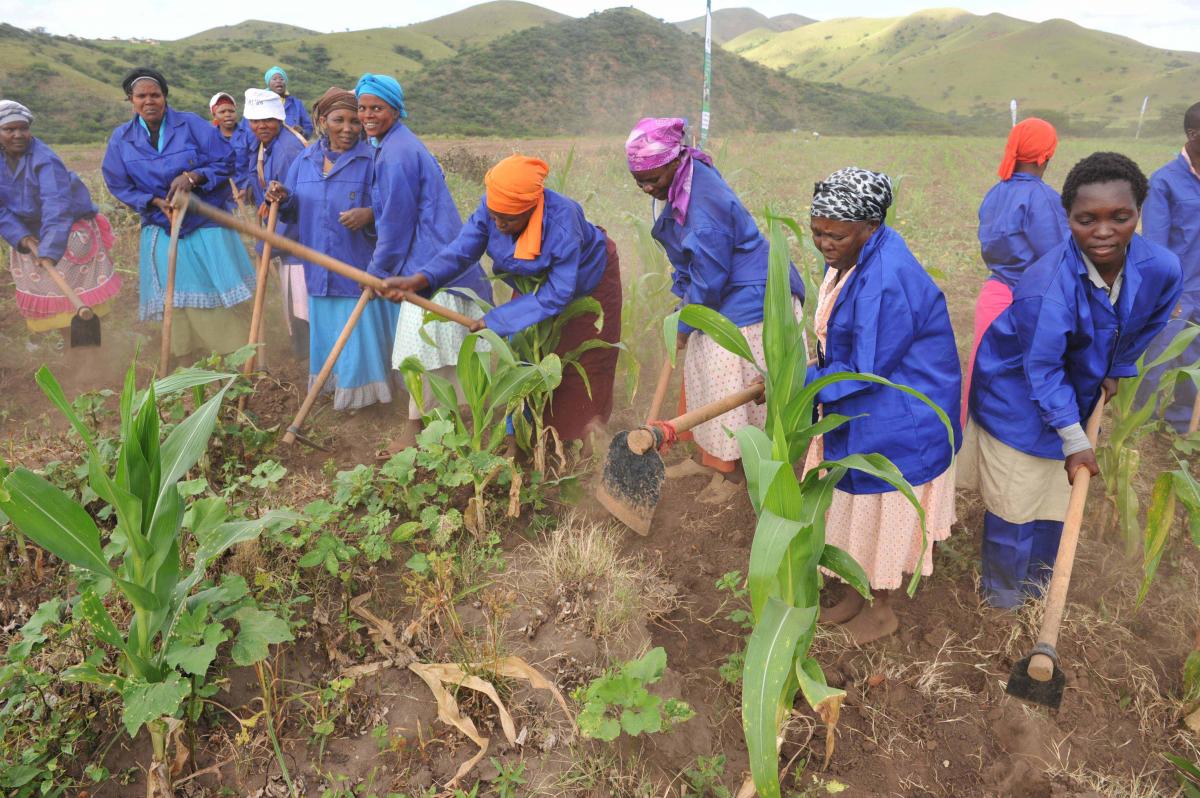 It is precisely because of the critical role that workers play that we must not only appreciate them, but ensure that their rights are protected.
It is precisely because of the critical role that workers play that we must not only appreciate them, but ensure that their rights are protected.
Government is committed to promoting human and worker rights, as enshrined in international law and in our national laws, as is expected of member countries of the International Labour Organisation.
In 2019, the working conditions of South African workers show the progress we have made in 25 years of freedom and democracy to overturn the exploitation, lack of dignity and lack of safety and tenure – in the case of farm workers – that workers endured under apartheid.
Over the past few years, government has introduced progressive labour legislation – in line with the Constitution of the Republic of South Africa of 1996 – to ensure safe, healthy and conducive working conditions for workers. Some of the labour laws are intended to combat workplace discrimination.
As a demonstration of our commitment to reduce poverty in South Africa, the National Minimum Wage (NMW) Act of 2018 was implemented to improve the lives of over 6.6 million workers who are now benefiting from the new wage.
The NMW seeks to advance economic development and social justice by improving the wages of the lowest paid workers. It stipulates that workers in certain industries should be paid R20 an hour – equivalent to R3 500 per month, depending on the number of hours worked.
The NMW for farm and forestry workers is R18 per hour; R15 per hour for domestic workers and R11 per hour for Expanded Public Works Programme workers. The NMW Commission will review these pay levels annually.
Employers who fail to comply with the Act will be named and shamed by publishing their names on the website of the Department of Labour. Other penalties include compelling non-compliant employers to pay the worker twice the amount that is owed for non-payment.
About 1 392 inspectors have also been stationed across the country to monitor compliance. A special focus of the inspection is the wholesale and retail sectors as they have been identified as some of the problematic sectors.
Meanwhile, I urge employers to collaborate with government in bringing an end to poverty by complying with this new law.
Workers play an important role in growing our economy, and therefore their rights and well-being should be protected.
SA team masters kung fu on global stage
SA team masters kung fu on global stage UrsulaA Kung Fu development squad that excelled against 6 000 athletes from 32 countries has shown that sport can help overcome life’s obstacles.
A group of South African kung fu fighters showed the world what they are made of when they bagged an impressive eight medals at the Hong Kong International Kung Fu Championships in April.
The nine members of the victorious South Africa Youth Kung Fu Development Squad come from different areas in Cape Town, including Gugulethu, Mitchell’s Plain and Grassy Park.
The team competed in the tournament last year too and is proud that it improved its 2018 medal count.
Eleven-year-old Saifullah Chafeker, who is the son of the team’s coach, kung fu master Junaid ‘MJ Li’ Chafeker, was among the team’s medallists, winning gold in his division. He also took gold last year.
Salma Natalie Doran, who competed as the first South African female at the tournament, also won gold in the ladies’ beginners division.
MJ Li won three gold medals in the professional division, for tai chi, weapons and bare-hand dual.
Sinawo Yola (17) and Muhajir Abrahams (11) both won silver medals and the entire team competed in the Team Synchronised Event, where they won gold.
Shortly before the tournament, Boran said she first joined the programme to learn how to protect herself.
The 30-year-old Cape Town resident said kung fu has helped her learn a lot more than she expected when she joined the squad.
“There are many benefits, including a healthy lifestyle, healthy body and the ability to protect yourself. With the self-discipline that comes with kung fu, you can achieve anything you put your mind to,” Boran said.
With the exception of MJ Li and Boran, the team is made up of youngsters between the ages of 11 and 17.
MJ Li said he started the development squad after visiting China and seeing the impact the sport had on the behaviour of the youth in that country.
He said one of the team members, who lives in Gugulethu and does not have a father, has benefited greatly from his participation in the sport. Not only did he travel to Hong Kong for both the 2018 and 2019 championships, but his grades have improved and his school has reported that he has become a well-rounded individual with a great temperament.
Sorghum brews success for rural farmers
Sorghum brews success for rural farmers angenithaA group of Eastern Cape emerging farmers are set to expand their business by 85 percent within five years, after getting a contract to supply sorghum to the makers of Chibuku, a traditional sorghum beer.
Nondobo Agricultural Cooperative started growing sorghum in 2016 following a collaboration with LM Holdings (LMH), a black female-owned company. The partnership created a win-win situation, with Nondobo bringing funding and plenty of land to the table and LMH contributing an uptake agreement for the supply of sorghum.
Luleka Mbete of LMH is a graduate of both the University of Johannesburg (corporate governance) and the Institute of Chartered Secretaries (finance and law).
She became interested in farming in 2008. Research in the sorghum industry and its market led her to United National Breweries (UNB), the makers of Chibuku.
“I got an offtake agreement from UNB but at the time, it was difficult to get funding because of the global financial crisis, so I put that dream on ice and got a job. In 2016, I tried again because sorghum fascinated me and I thought there was a large scope for growth in the market,” she said.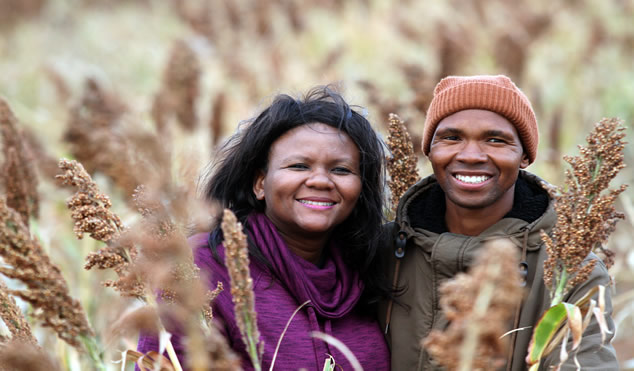
An offtake agreement is an agreement between a producer and a buyer to purchase or sell portions of the producer's future production. UNB again gave her another off take agreement, along with seeds and fertiliser. “I needed a tractor and labour so I joined forces with Nondobo Agricultural Cooperative. At the time, they had R500 000 in grant funding from the Eastern Cape Development Corporation to plant sorghum but they had no contract to supply anyone. So we worked together and planted 90 hectares in Dutywa,” said Mbete.
Diageo, which owned UNB and distributes Smirnoff, Captain Morgan, Johnnie Walker and Cîroc, among other brands, provided support through its empowerment trust.
Today, Nondobo Agricultural Cooperative has all the equipment needed to farm efficiently and is set to plant 2 000 hectares this year, after another 10 land-owning cooperatives joined the partnership.
“Our target is 12 000 hectares in five years,” said Mbete, adding that challenges they still face are narrow roads not suitable to their machinery and a need for additional fencing.
The Arch casts his special vote
The Arch casts his special vote vuyelwan“Thank you for coming,” says Archbishop Tutu after casting his special vote.
Shortly after 10am on Monday morning, Archbishop Emeritus Desmond Tutu walked out of his front door in a jovial mood after casting his special vote.
With the aid of his walking stick, and with a local ward councillor and an official from the Independent Electoral Commission (IEC) alongside him, the Arch – with a wide smile on his face – waved at the media contingent that was parked outside his gate before blowing a kiss and walking back into his house.
“Thank you for coming,” he said.
He did not conduct any interviews or answer questions.
Tutu was among several South Africans around the country who applied to cast a special vote ahead of the General Elections on Wednesday. 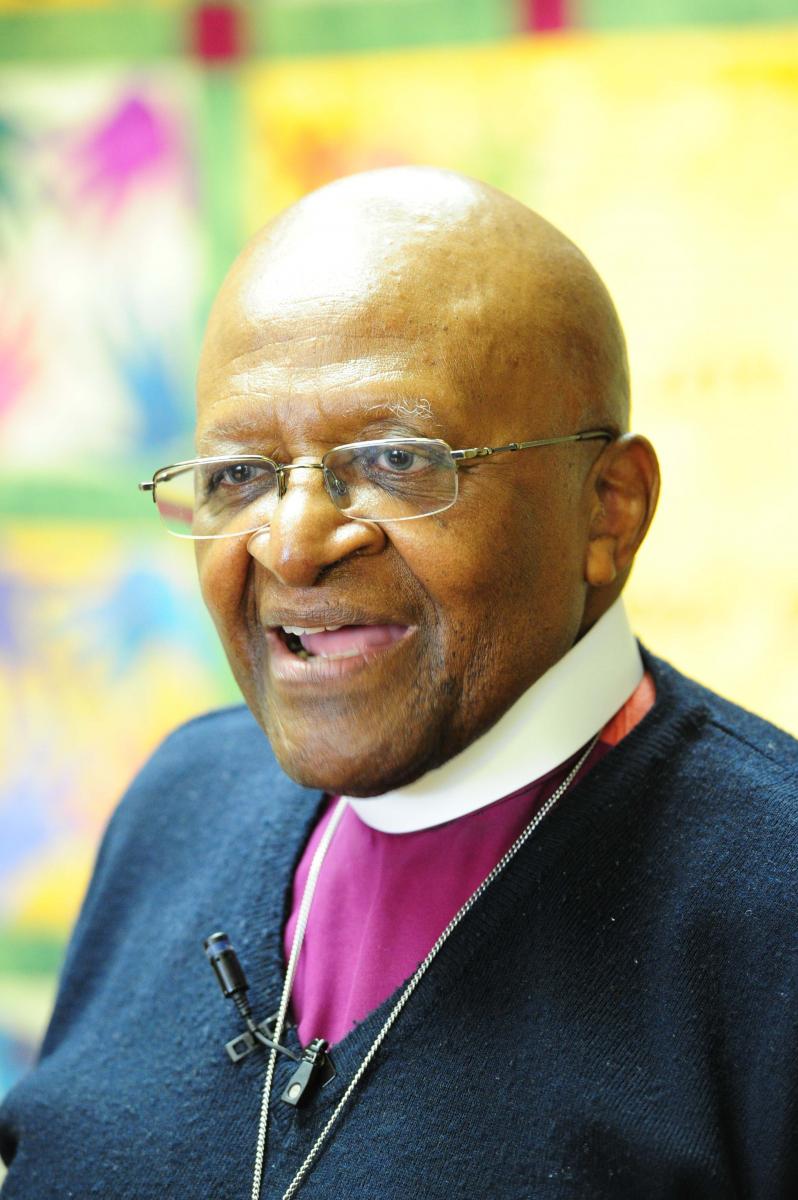
A special vote is aimed at allowing registered voters who cannot vote at their voting station on Election Day.
As Tutu made his way back to his house, Wandisile Ngeyi, the ward councillor of ward four, which includes Milnerton, said he accompanied IEC officials as an observer to ensure that he was satisfied with how the voting was conducted.
He said Tutu and his wife, Leah, were in high spirits after they cast their votes at their Milnerton home.
“The Arch was very happy [sic] to cast his vote together with his wife. They are in a very healthy condition. They really appreciate being given an opportunity to exercise this important right,” he said.
Well-known around the world for his anti-apartheid activism, Tutu, who turned 87 last year and is now retired, has kept away from public life in recent times.
The last time the Nobel Peace Prize winner was in the news was when he was admitted to a Cape Town hospital for a series of tests. Tutu has for over two decades battled with prostate cancer.
On Monday, Ngeyi said while Tutu appeared in high spirits ahead of casting his special vote, he had a serious look on his face as he marked his ballot.
“I would say he was serious because as we know, he is old but he is very much concerned [about] the political developments around the country. He is quite aware of what is going on around the country so he wanted to make sure that he [does] the right thing,” he said.
When Tutu last voted at Milnerton High School during the 2016 Local Government Elections, he said voting to him remained a dream.
“It still is a dream, you know, that one can vote in South Africa as a black person. It is fantastic and I hope everybody will want to use their vote in the right way,” he said.
Special voting will take place on Monday and Tuesday from 9am to 5pm, and voting on Election Day - 8 May - takes place from 7am to 9pm
– SAnews.gov.za
UIF pay-out paves the way to entrepreneurship
UIF pay-out paves the way to entrepreneurship LondekileMichelle Mathuloe (31) is a good example on how to turn a bad situation into a flourishing business.
After being retrenched from her job as a Pharmacist Assistant in 2016, she took-up an opportunity to be trained on how to manufacture furniture using pallets and car tires.
After acquiring the skills, she used her Unemployment Insurance Fund (UIF) to buy equipment that she needed to start her business, Puni Vibrant Creation.
“After receiving the skills that I needed, I started my business in 2016 and I have been selling my products to local households and businesses,” she said.
Mathuloe hails from Phokeng in the Kgale area near Rustenburg, North West this is also where she supplies her product.
She adds that although she does receive orders from outside the North West, she is is still working on growing her footprint.
“At the moment, I am doing most of the work by myself. I only have one person that I call for help whenever business is too much for me to handle,” she said.
In 2017, Mathuloe approached the National Youth Development Agency (NYDA) to apply for a business grant. Her application was successful and she received about R47 000 which was used to purchase more equipment for her business.
She said this has helped her to complete her tasks quicker and to improve the quality of her products which she is able deliver to clients on time.
Once she has been able to grow her business, Mathuloe wishes to empower the youth in and around her community.
She would also like to collaborate with local businesses so that they can grow the economy of North West.
Her advice to young people who would like to start businesses is that they should not be in a hurry to make money, although it is a commodity that everyone needs, but they invest in getting the necessary skills that they will help them get money.
For more information on services offered by the NYDA call 0800 52 52 52.
Unemployed youth given a helping hand
Unemployed youth given a helping hand JoyLebogang Sothane says being part of the Youth Employment Service (YES) initiative will take him far in his career.
Sothoane is among the 3 315 young people, who were recently inducted into Nedbank’s workforce through the YES initiative.
This brought an end to the 27-year-old’s four-year journey to find employment.
Completing her matric in 2011, Sothoane registered for a degree but was forced to drop out due to financial constraints.
 “In 2014, I stayed at home, dropped out and in 2015, I did my Logistics degree through the National Student Financial Aid Scheme,” she said.
“In 2014, I stayed at home, dropped out and in 2015, I did my Logistics degree through the National Student Financial Aid Scheme,” she said.
Sothoane is among the inductees who will now work for Nedbank under the YES initiative that was launched by President Cyril Ramaphosa in 2018. Sothoane, who shared the stage with the first citizen during a panel discussion together with two other YES inductees, did not hold back in telling the President the challenges they faced in getting a foot in the door of the workplace.
Among the challenges she highlighted were being denied access to entry level posts due to a lack of experience, as well as financial exclusion at tertiary institutions due to a lack of funds, and cases where one cannot graduate because their student fees are in arrears.
Nedbank Group Chief Executive Officer Mike Brown said the bank is taking on the youth as a way to make a dent in South Africa’s high unemployment figures.
“We want to go beyond business as usual and create meaningful job opportunities for our youth,“ said Brown at the ceremony held at the bank’s Sandton premises.
The President listened intently to the concerns raised by the youth during the panel discussion.
“I am troubled by this,” said the President, referring to the country’s unemployment figures and challenges faced by youth in obtaining employment.
In many ways, said the President, Nedbank and other companies which have taken on youth employees have gone beyond the call of duty.
“There are so many unemployed young people. I have interfaced with it at a close range,” President Ramaphosa said, adding that the prerequisite for experience for young employees has turned out to become a barrier.
To date, the YES initiative has managed to secure 17 000 work opportunities for unemployed youth.
YES initiative gives youth wings to fly
YES initiative gives youth wings to fly LondekileThe Youth Employment Service (YES) initiative aims to offer one million unemployed youth paid work experiences over a period of three years.
A brainchild of President Cyril Ramaphosa, the programme aims to prepare young people for employment and provide them with the technical skills needed to underpin the industrialisation of the economy.
YES is also a joint effort by government, labour and business which ensures that South African youth is prepared for employment.
To date, the YES initiative has managed to secure 17 000 work opportunities for unemployed youth.
If you are a young person and you would like to be part of the YES initiative here is what you need to know:
What is the qualifying criteria for youth to be part of the YES programme?
YES youth must be:
- Black, in accordance with the BEE definition.
- Between the ages of 18 – 34 (as this is the definition of youth); and a South African citizen.
- The YES programme is not for young people who want to change jobs but rather for currently unemployed youth.
What qualifications are needed to be part of the YES Initiative? Can someone without a university qualification register?
YES is aimed at all unemployed black youth between the ages of 18-34 years, regardless of the level of education you have obtained.
Are you able to help the youth that live in rural areas?
YES is aimed at all the unemployed black South African youth wherever they are situated in the country.
Does YES provide Non-Government Organisations and small businesses with funding opportunities, office space and/or equipment?
The type of support that YES offers to businesses and NGOs is non-financial, through capacity development as well as placing a young person in their businesses as a resource. Unfortunately, we are unable to provide funding, office space or equipment or connections to other stakeholders.
How does YES assist young aspiring business owners? Do you provide funding?
Unfortunately, YES does not offer financial support to young aspiring business owners. However, we can assist new businesses (SMMEʼs) by capacitating them with fresh, young and creative youth.
I am running a small business and I would like to host YES youth, but I cannot pay their salary. How can I get involved in YES?
Sponsored host placements are a part of the YES programme. Corporates who meet their YES target can choose to place the youth in their own business or at a host SMME through a sponsored host placement, at no cost to the host. The young person will work in the host business for a period of 12 months and will be paid by the sponsor company.
Can I choose the youth I want to host?
Yes, you can we will work with you to select the right person for your organisation.
Can the same youth be sponsored for more than one year?
No, YES Youth are sponsored for a period of one year. If you decide to absorb your YES Youth after the year-long period, then you will be responsible for salary payments.
I have already registered. When will the placement of work opportunities start?
We are currently in the process of creating work opportunities, which is a complex and lengthy process.
However, our team is working tirelessly to fulfil our mandate of creating one million work opportunities for the unemployed youth of South Africa. Once we have created these experiences, we will then begin to make placements. If you have registered, we will be in touch with you
How do I register to be a YES Youth?
Please log onto our website: www.yes4youth.co.za/youth-registration where you can register as a YES Youth.
Young author shines with first book
Young author shines with first book angenithaWriter Adaeze Ogechi Ugwu from Pretoria, Gauteng is enjoying the accomplishment of being a published writer.
Her first book, “The Duck Who Thought It Couldn’t Swim”, was published last year before her 10th birthday by AuthorHouse, an international self-publishing company.
Ugwu is the publisher’s youngest author.
The book was written in 2015, when the then seven-year-old Ugwu was struggling to swim.
“I was learning how to do the backstroke and I just couldn’t do it. It was harder than freestyle swimming. You have to keep your face above water, but the water still splashes on you. I didn’t like the feeling of water on my face. I kept thinking I was going to drown. It was scary,” she recalled.
Ugwu used her pen, paper and coloured pencils to express her feelings, and two months later, she had completed writing and illustrating “The Duck Who Thought It Couldn’t Swim”.
The story tells the uplifting tale of Fluffy, an adorable duck who has to find the courage to swim after having ducklings.
“The moral of the story is that courage beats fear. I overcame my own fears while swimming and now the backstroke is my favourite swimming style. I wanted to encourage people to do the same,” she said.
Ugwu’s parents Phindile and Emeka considered laminating the book for her to keep as a memory, but knew the story’s motivational message had to be shared. Phindile approached the publishing company, who also saw the book’s potential.
The soft-spoken Ugwu was excited when she received the first copies of the book.
“I was happy but confused, because I never thought it would happen. At school, my principal was so excited and everyone congratulated me. The book was showcased at Book Week and there are copies of it in the school library. It’s nice knowing that people like my book.”
The book has already been showcased at book fairs in Germany, New York, Mexico, China and England. Ugwu has also donated her book to charities and a public library in Barberton, Mpumalanga.
“It is important for children to read. It helps develop your thinking, your knowledge of words and writing, and it helps you with your homework. Reading for pleasure is wonderful. Your personality grows when you read,” she said.
mLab develops digital skills in the Northern Cape
mLab develops digital skills in the Northern Cape LondekileWhen youngsters are empowered with the right skills to innovate and create solutions, they unlock the opportunities for new businesses.
The youth of the Northern Cape are becoming better equipped to thrive in the modern world as new technology training facilities and programmes start making their mark in the province.
In 2019, technology non-profit company mLab Southern Africa, in partnership with national and provincial government, launched one of their labs in Galeshewe, Kimberley.
The lab provides a range of services, including training, workshops and other events that aim to empower youth with digital skills.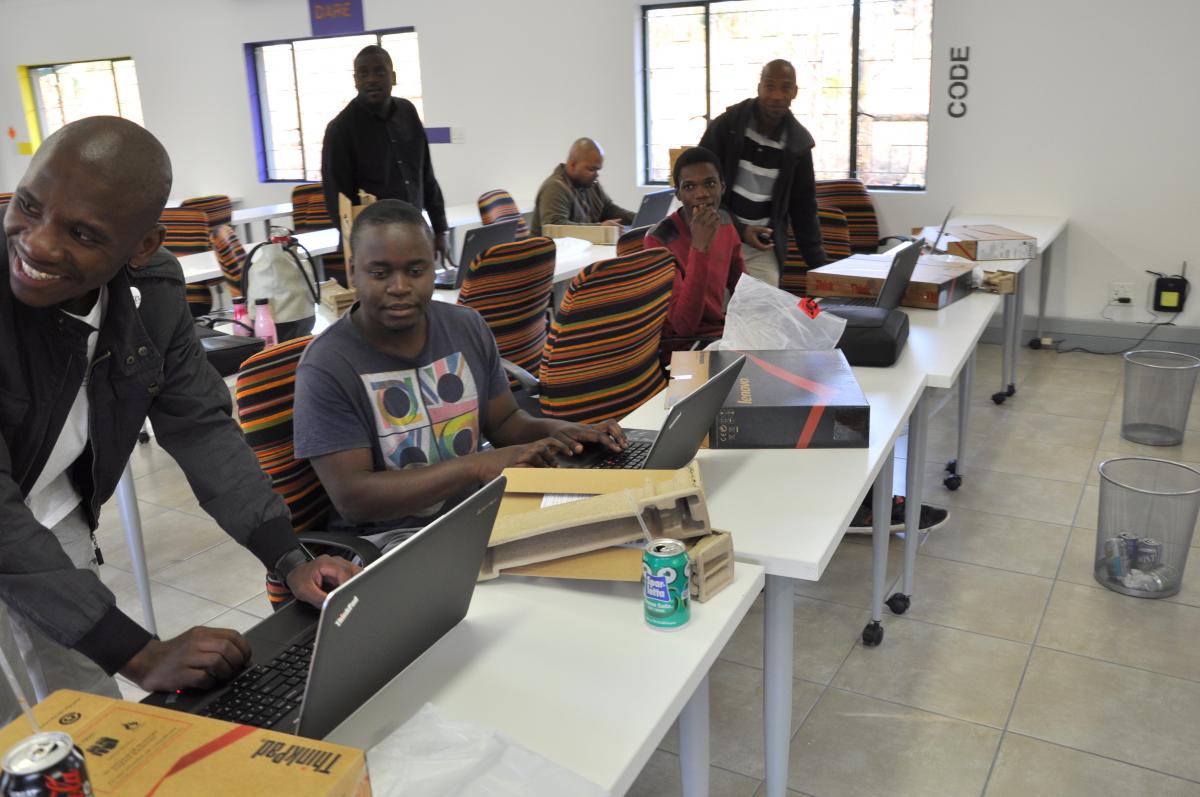
“The expansion of mLab into the Northern Cape is part of a multi-province expansion in South Africa,” explains Mapaseka Dipale, mLab’s provincial coordinator for the Northern Cape. “The world is changing very fast due to innovation and digital disruption. These bring opportunities for young people to gain new skills, future jobs and even start their own businesses.”
Recently, mLab Northern Cape held its first Digital Empowerment Programme. The six-week programme supported by the Department of Social Development, ensured that 10 unemployed youth receive training.
They were provided with training on website development and social media management. After the programme, seven of the students were placed in different technology companies in the province to start one-year internships.
“Skills included basic website development using WordPress, creating social media posts and designing flyers. The tools are free and anyone can access them, which allows participants to transfer these skills to the rest of the community,” Dipale explains.
“I was worried that it might be very complicated, but then I saw that it is actually quite logical and a lot of fun and I have been able to add a good skill to my CV,” says Maxine Williams (23), one of the programme participants.
Williams is about to start her 12-month internship with a graphic design company in Kuruman.
“I am very grateful to mLab for helping me get started with my career. So many youths do not have the basic digital skills they need to succeed, and it is very important that mLab is helping them learn these skills,” she says.
*Young people and entrepreneurs who want to get involved with mLab can go to https://mlab.co.za/programmes/ to apply for various programmes.
uMsinga women fight poverty
uMsinga women fight poverty JoyNot all heroes wear capes. There are a number of everyday heroes among us, quietly making a difference in their communities.
One such person is Lelly Mntungwa of uMsinga in KwaZulu-Natal, who started a clothing manufacturing business that has created over 100 jobs for local women and youth.
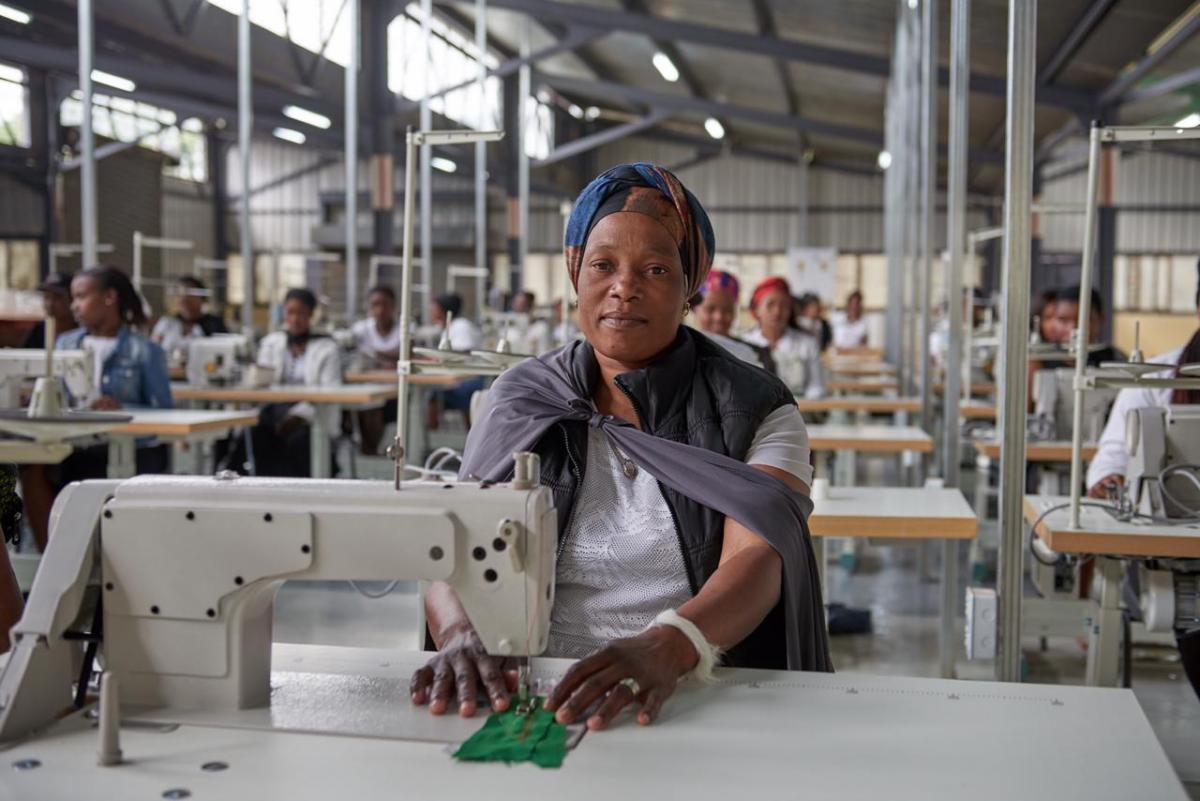 Mntungwa owns uMsinga Clothing Factory which she established after reading a report that was released in 2010 and revealed that uMsinga was one of the poorest communities in the country.
Mntungwa owns uMsinga Clothing Factory which she established after reading a report that was released in 2010 and revealed that uMsinga was one of the poorest communities in the country.
Thousands of families were left without an income when a massive shoe factory in the area closed down about 25 years ago.
The plight of the community prompted Mntungwa to leave her plush job at a bank and invest her own money into restoring part of the dilapidated shoe factory to house her new business. She hoped her own business would be a beacon of hope for the area’s downtrodden residents.
“I took the decision to resign and come back home so that I could help revive the economy of my area,” Mntungwa told Vuk’uzenzele.
The factory has so far managed to create jobs for 137 people, the majority of whom are women.
“I decided to manufacture uniforms for school children because the only other factory that manufactures school uniforms in KwaZulu-Natal is based some distance away, in Durban,” she explained.
Mntungwa said it is important for her to empower women, most especially in more neglected rural areas where there is a lack of access to information and resources.
“Rural life is still very much dominated by a patriarchal system where women find themselves working harder to prove themselves,” she said. She said it is also common for them to drop out of school to run their child-headed family.
“The situation compelled me to intervene and develop these ‘young wives’ through skills transfer,” said Mntungwa.
She empowers them through job creation and skills capacitation.
“I believe skills transfer is a sustainable gift – it can empower people to become income generators and survive during difficult situations,” she added.
The factory also employs 50 young people who produce sanitary pads to help solve the problem of young girls in rural areas missing school when they are menstruating.
Mntungwa’s business is funded through the women economic empowerment programme run by the KwaZulu-Natal Department of Economic Development, Tourism and Environmental Affairs (EDTEA). Over R4 million has been committed.
Funding already received has helped Mntungwa rehabilitate a large section of the old factory and this in turn has enabled her to expand her operation and create more jobs.
EDTEA MEC Sihle Zikalala has praised Mntungwa for her vision and thanked her for the sterling job she has done in trying to eradicate poverty in the area.
“We are also proud that she employs women. We will continue to support initiatives like these as they become the engine of development," the MEC said.